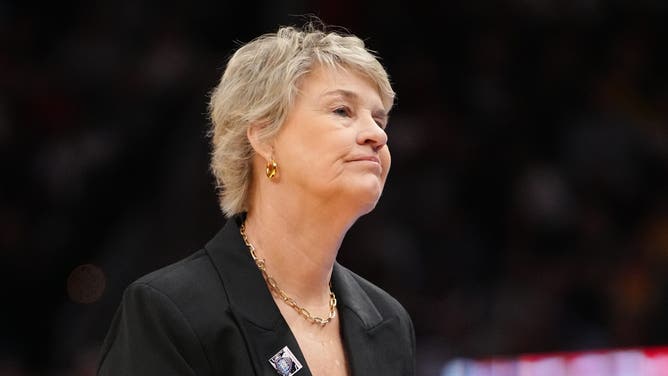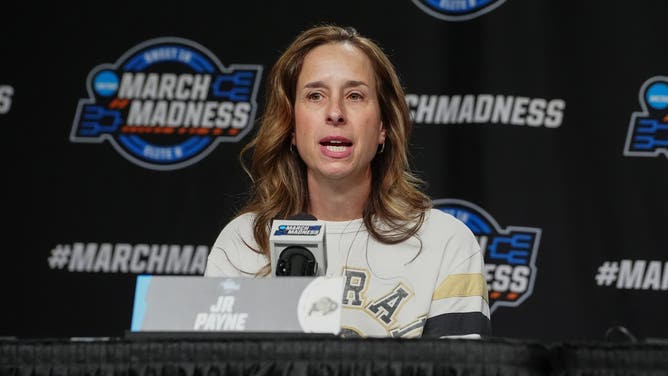Iowa’s Lisa Bluder, 14 Other Women's Basketball Coaches Dodge NCAA Transgender Question
The day before the NCAA women's college basketball national championship game, OutKick asked both South Carolina head coach Dawn Staley and Iowa head coach Lisa Bluder if they thought transgender women (biological males) should be allowed to compete in women's college basketball.
Staley made national headlines when she proclaimed, "I'm of the opinion that if you're a woman, you should play. If you consider yourself a woman, and you want to play sports or vice versa, you should be able to play."
When asked the same question a few hours later, Bluder declined to answer. She stated that she was solely focused on the national championship game against South Carolina. However, she did add that, "it’s an important issue for another time."
OutKick has since followed up with the Iowa athletics department to see if Bluder would be willing to comment, since she no longer has to worry about the national championship.

Iowa head women's basketball coach Lisa Bluder still won't say whether she thinks transgender women (biological men) should be allowed to compete in NCAA Women's Basketball.
(Zach Boyden-Holmes/The Register/USA TODAY Network)
The athletic department first told us that Bluder had to turn her attention to the WNBA Draft to support Caitlin Clark, the star Hawkeye who was drafted #1 overall by the Indiana Fever.
Following the WNBA Draft, OutKick circled back with Iowa. This time, they told us that Bluder "went straight to recruiting from the WNBA Draft."
Fair enough, although it does seem that she might have found some time in those two-and-a-half weeks to answer a fairly straightforward question.
One of the criticisms OutKick received over asking Staley and Bluder the question was that we should ask other women's college basketball coaches and not just those two. That's a reasonable and fair criticism.

South Carolina Gamecocks head coach Dawn Staley and Iowa Hawkeyes head coach Lisa Bluder shake hands before the National Championship of the 2024 NCAA Women's Basketball Tournament.
(Ken Blaze/USA TODAY Sports)
So, we did. OutKick reached out to every school that reached this year's Sweet 16 in the Women's NCAA Basketball Tournament to ask if the head coach would be willing to answer two questions. We gave each coach 48 hours to answer our questions, which were:
- Do you believe that transgender women should be allowed to compete in women’s college basketball?
- Why do you feel that way?
Here are the responses we received from the athletic departments of those schools.
Lisa Bluder, Iowa
No response after attaching the deadline.
Cori Close, UCLA
"Coach Close declines to comment on the questions below."
Kara Lawson, Duke
"We will respectfully decline the opportunity to comment."
Nicki Collen, Baylor
"Appreciate you reaching out on this. We’re going to decline to participate in this story."
JR Payne, Colorado
"Coach Payne will respectfully decline to comment at this time. She's been out recruiting all this week as the team has lost a lot of pieces to the transfer portal since the end of the season."

Colorado Buffaloes women's basketball head coach JR Payne "respectfully declined" to answer whether transgender women (biological men) should be allowed to compete in NCAA Women's Basketball.
(Gregory Fisher/USA TODAY Sports)
Vic Schaefer, Texas
"We’ll pass on this one."
Lindsay Gottlieb, USC
"USC will decline to comment at this time."
Kim Mulkey, LSU
Did not respond to requests for comment.
Geno Auriemma, UConn
Did not respond to requests for comment.
Niele Ivey, Notre Dame
Did not respond to requests for comment.
Tara VanDerveer (retired after the season) & Kate Paye (hired in April), Stanford
Did not respond to requests for comment.
Wes Moore, NC State
Did not respond to requests for comment.
Teri Moren, Indiana
Did not respond to requests for comment.
Scott Rueck, Oregon State
Did not respond to requests for comment.
Lisa Fortier, Gonzaga
Did not respond to requests for comment.
NCAA women's basketball head coaches decline to answer questions about transgender women participating in women's college basketball.
Other than Dawn Staley, none of the other 15 coaches who reached this year's Sweet 16 was willing to say publicly whether they support transgender women (biological men) in women's college basketball.
With the NCAA Board of Governors set to meet on Thursday to discuss the issue of transgender athletes competing in the NCAA, perhaps the coaches are waiting for the governing body to announce its position before publicly stating their own opinions.
Although, these coaches carry great weight in women's sports and there's no question that basketball is the biggest women's sport in the entire NCAA. So, their opinions on the subject might sway some of the decision-makers, if they were to give them.
Unfortunately, not one of them is willing to do that.
"It’s disappointing that influential coaches of elite women’s teams don’t speak up to defend their players," Riley Gaines, host of the OutKick podcast "Gaines for Girls," said.
"Not only should it be a moral necessity for these 15 coaches, but they should WANT to do it. It’s literally in their job description," she continued.
"It should be the easiest thing in the world for the coaches who have built their careers on playing sports and then developing top level female players to say women deserve a level playing field. That argument isn’t controversial. It’s common sense. Their silence on this issue displays a disheartening lack of moral clarity."